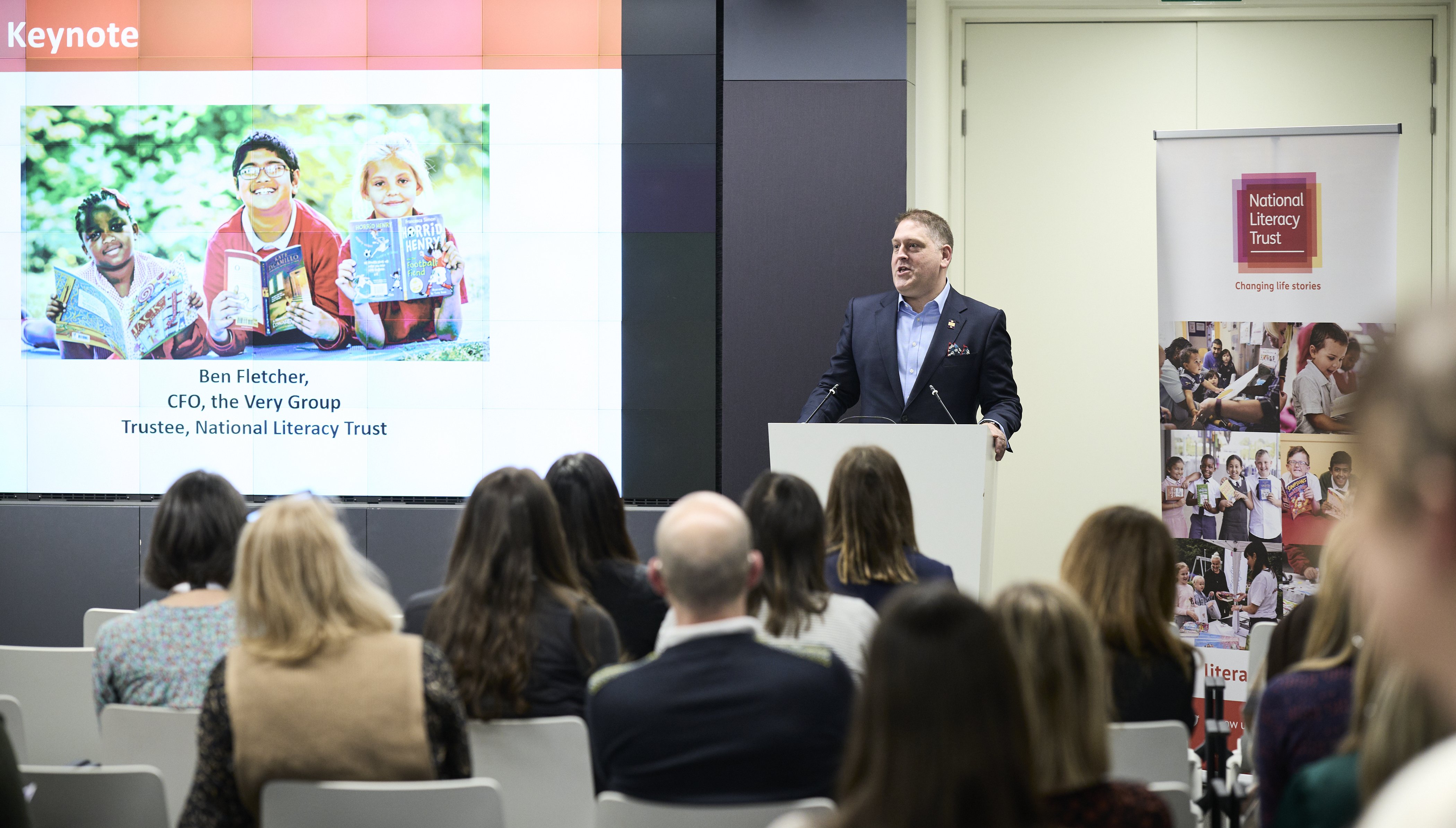Article by: Ben Fletcher, Chief Financial and Transformation Officer, The Very Group and National Literacy Trust Trustee
By leveraging the resources we have and engaging in our communities, our collective ability to create an impact in closing the literacy gap is significant.
Why is it important to improve literacy levels?
When we discuss literacy, we are not just thinking about the ability to know the right grammar, master the punctuation, or construct a sentence. To be literate means to be able to be understood, to be able to engage in discussion. It means being able to spark ideas, stimulate creatively, and open up new worlds – real or imagined.
For many children in England, this is an incredibly difficult reality. Nearly 1 in 10 children from disadvantaged communities do not own a single book. There are 4.3 million children in poverty in the UK, and each year, 200,000 children leave reception without the skills to learn to read. This is a catastrophic waste of their talent, potential, and capacity for enjoying a good life.
What is the significance for businesses?
Businesses rely on a strong society in order to thrive, including relying on the skills of their employees. Businesses then play a crucial role in contributing to society by meeting needs, creating new skills and opportunities, and improving experiences.
The modern economy is changing rapidly; from the post-pandemic change in working habits and the technological drive of the fourth industrial revolution, the way we consume, work, and communicate has been completely changed. Now more than ever, we need skills like ingenuity, creativity, and the ability to connect, which cannot be automated away by technology. However, these skills are limited or even impossible without literacy.
Early language and reading skills are intertwined with life chances and social mobility. However, children in low-income families begin to fall behind high-income families in their language and reading skills at around 16 months old. In fact, a child struggling at five years old is five times more likely to fail to reach the expected standard in English by the end of primary school, and we have seen that 89% of children who do not reach the expected standard at the end of primary school will not get to grade 4 in their GCSE.
We need to think about how engaged our employees are, and the tools we are giving them to create a great home learning environment.
How can business help improve literacy?
Businesses can play a crucial role in addressing this issue. This is why we continue to support the Vision for Literacy Business Pledge, to use the tools that businesses have to join the national literacy campaign and help close the country’s literacy gap and boost social mobility.
Five tools businesses can use to improve literacy outcomes
There are five tools that business has at their disposal to leverage in support of improving literacy outcomes:
- Colleagues
- Community
- Communication
- Collaboration
- Capability
Colleagues
Colleagues are the most critical resource at any organisation's disposal. We most often think of our colleagues as a potential resource for volunteering, providing colleagues with allotted days in their contracts for volunteering and giving back to the community. However, we must also think of our colleagues as parents, grandparents, and carers. We can help support them as they create a great home learning environment, help give new parents support and advice, give them access to a network, perhaps even provide them with books. With over 80 businesses signed up to the pledge, the number of colleagues we can reach and connect with must amount to hundreds of thousands of families.
Community
Every business has a place they call home. For my organisation (The Very Group), it is the great city of Liverpool. Each of us can have an impact focused on our immediate community. Using the model of the Literacy Hubs, businesses can all forge partnerships with local companies, community partners, and third sector organisations, to create and implement programmes that will make an impact. We should also recognise that larger businesses have the power and ability to convene, and join up fragmented local efforts to enable programmes to have a greater impact.
Communication
Between all the signees of the Vision for Literacy Business Pledge, we reach millions of consumers. This is a great chance to educate on the critical issue of low literacy outcomes, inform consumers how they might help, and help out by implementing widespread programmes. For example, in 2013 McDonald’s began partnering with the National Literacy Trust to distribute books it its Happy Meals. Over the past 10 years, McDonald’s has now distributed 61 million books through its programme, benefiting countless families who wouldn’t have access to books otherwise.
Collaboration
Every business has a huge network of partners they collaborate with, whether it is within the supply chain, third party suppliers, marketing agencies, or financial and legal advisors. Bringing these partners into the work you are doing, can create an even bigger impact and lead to creative ideas for programmes that combine every organisation’s resources.
Capability
Every single business has a unique set of capabilities and resources at their disposal they can use to contribute to help improve literacy outcomes. Whether that might be in the form of providing food, lining up optometry visits with book distributions, book donations, or holding financial literacy sessions, there are many avenues that a business can take to apply its own unique capabilities and assets in order to create an impact on their communities and for children who would otherwise be left behind.

This is not just about Corporate Social Responsibility (CSR) and Environmental, Social, and Governance (ESG). Engaging businesses in this effort is creating genuine connections to people and places, and solving societal problems.
Businesses have a decisive role in improving literacy outcomes in the UK. We need to think about how engaged our employees are, and the tools we are giving them to create a great home learning environment. We need to look at the programmes and impact we are creating in the communities our businesses call home. We need to help our consumers through awareness, or product and service solutions. We need to examine the partnerships we can forge that can help make a difference, and look the resources we uniquely bring to the table.
By leveraging the resources we have and engaging in our communities, our collective ability to create an impact in closing the literacy gap is significant.
Find out more about how you can get your business involved in the Vision for Literacy Business Pledge and get in touch by emailing policy@literacytrust.org.uk
